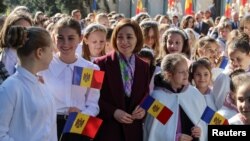The Russian propaganda tabloid Komsomolskaya Pravda in Moldova, along with several other Russian news sites, recently accused Moldovan education officials of brainwashing students to hate Russia.
The publications reported that starting September 1, Moldovan schools will introduce “Russophobia lectures” under the guise of “solidarity with Ukraine,” and “prepare students for war.”
"How schoolchildren in Moldova will be brainwashed starting from September 1: The Ministry of Education has scribbled down a manual on instilling hatred towards Russia in children,” Komsomolskaya Pravda in Moldova reported on August 22.
This is misleading.
The Russian propaganda outlets refer to a new addition to Moldova’s public schools curricula: an annual lecture called "Together for Peace." Moldovan officials say the lecture is designed to promote solidarity, compassion, and peaceful coexistence, not hatred.
Scheduled for September 1, it is intended to celebrate the 75th anniversary of the Council of Europe as well as Moldova’s launch of its European Union Uccession process earlier this year. Despite propagandist claims, there is no evidence that the lectures incite anti-Russian sentiment or prepare students for war.
The "Together for Peace" lecture has eleven different versions, each tailored for various grades. Only one version, "Grades: VIII-IX (version 3)," mentions Russia. In its Annex 1, the lecture provides an example of how EU countries united to support Ukraine when it became a victim of Russian aggression.
Appendix 1, entitled “E.U. Solidarity with Ukraine,” states the obvious historical facts, including that on February 24, 2022, Russia launched a full-scale invasion of Ukraine and that the EU responded with swift sanctions, isolating Russia economically and supporting Ukraine. Ukraine gained EU candidate status in June 2022. The EU provided aid to fleeing Ukrainians, allocated €100 million to rebuild schools, and initiated a campaign for school bus donations.
Moldovan education officials say that the main objectives of the version that mentions Russia’s invasion of Ukraine, and the EU response, are to teach the competencies of democratic culture, such as respect for human dignity and human rights, responsibility, analytical and critical thinking skills, the ability to listen and observe, and empathy.
Moldova’s Ministry of Education and Research recommends that teachers adapt the objectives and activities to suit students’ needs. The activities aim to foster “critical thinking” and understanding of European values and Moldova's integration, without delving into “specific political debates.” The document also says that teachers should encourage students to form their own conclusions rather than imposing any political views.





